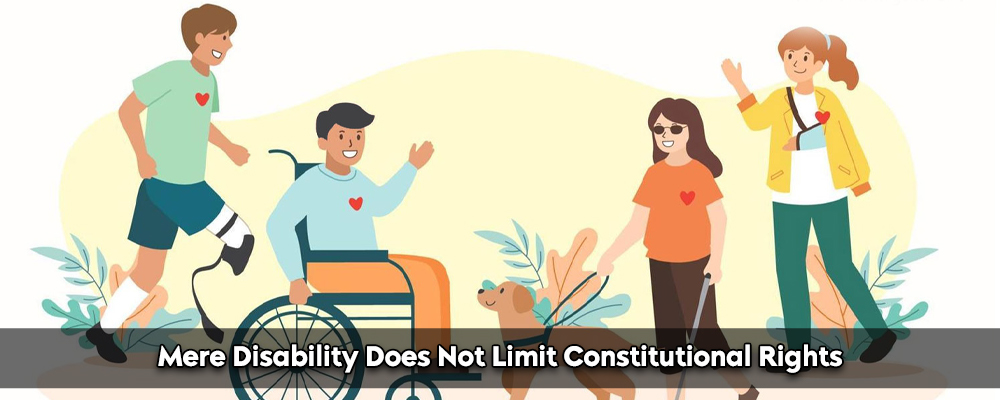A fundamental pillar of any democratic society is the right to equality and the absence of discrimination. One of the most crucial tenets in this regard is that no one deserves to be denied the chance to pursue their ideal profession or business just because of a disability. The ability to exercise one’s fundamental rights shouldn’t ever be hampered by a disability.
Frameworks of the Constitution
- Disability rights have been around for years a source of controversy in both law and society. People with disabilities have long experienced barriers to employment and other economic opportunities due to discrimination. Numerous international and national legislations have been passed to defend their rights as a result of this recognition.
- The Rights of Persons with Disabilities Act of 2016, in India, is an important step in protecting the rights of people with disabilities. The act recognizes the idea that a person’s disability shouldn’t prevent them from engaging in all elements of life, including job and economic pursuits.
Need A Legal Advice
The internet is not a lawyer and neither are you. Talk to a real lawyer about your legal issue

Role of Judiciary: Delhi High Court
- The Delhi High Court heard the matter, Santosh Bhutani & Anr. v Savitri Devi Through LRs. It was a disabled person attempting to prove her right to continue her business and perform her chosen profession despite her disability.
- It confirmed that a person’s ability to engage in any occupation or operate a business is not restricted by a simple handicap. In accordance with constitutional norms and legal protections, the verdict stressed the significance of protecting the right to equality and non-discrimination for people with disabilities. The commitment to guaranteeing equal opportunities for all, regardless of disability status, was reaffirmed by this decision.
Significance of the Ruling
- The ruling of the Delhi High Court strengthens the equality and non-discrimination pillars that are the cornerstones of the Indian Constitution. It strongly implies that, regardless of physical limitations, the law is on the side of individuals who wish to overcome obstacles and pursue their chosen professions.
- The development of an inclusive society has been significantly aided by this ruling. It recognizes that people with disabilities have a variety of skills and capabilities and that they ought to be given the chance to contribute to the labour market and the economy.
Combating Prejudice and Stereotypes
- Stereotypes in society are among the biggest obstacles that disabled people must overcome. These prejudices frequently exaggerate their limitations and presume that they are unable to accomplish particular goals or succeed in particular fields. In its ruling, the Delhi High Court challenges these preconceived notions and emphasizes the variety of potential that people with disabilities possess.
- The ruling also serves as an inspiration to disabled individuals across India. It demonstrates that with determination and the right legal framework, individuals with disabilities can overcome physical limitations and achieve success in their chosen fields.
Legal Protections for Disabled
- The Rights of Persons with Disabilities Act of 2016, which attempts to safeguard the rights of disabled people in India, is consistent with this verdict. The law acknowledges the significance of giving disabled people appropriate accommodations, equal opportunity, and freedom from discrimination.
- The UN Convention on the Rights of Persons with Disabilities (CRPD) is a treaty that India has ratified. Through this treaty, nations are required to defend the rights of people with disabilities, particularly their right to equitable treatment in the workplace.
Obstacles to Come
- Despite statutory safeguards and initiatives to promote diversity, attitudes that exclude people nevertheless exist. Disability-related discrimination in the workplace and missed opportunities for employment can be caused by prejudice and misinformation. It is essential to keep educating people about disability and encouraging optimistic attitudes around it.
- Economic obstacles, such as the expensive nature of assistive technology or a lack of availability of vocational training, can make it difficult for disabled people to enter their desired fields of work or launch their own enterprises. These issues must be addressed by both private and public efforts and government support programs.
The ruling of the Delhi High Court is a key step in India’s progress toward inclusion and equal opportunity for people with disabilities. It supports the fundamental pillars of the Constitution of India and pledges made on a global scale to safeguard the rights of people with disabilities. India can keep progressing toward a more inclusive and fair society where disability is seldom a hindrance to one’s hopes and aspirations by combating misconceptions, encouraging reasonable adjustments, and tackling societal and economic hurdles.
One can talk to lawyers at Lead India for any kind of legal support. Free legal advice online can be achieved from Lead India. Along with obtaining free legal advice online, one can also ask questions to the experts online free at Lead India.





 Talk to a Lawyer
Talk to a Lawyer